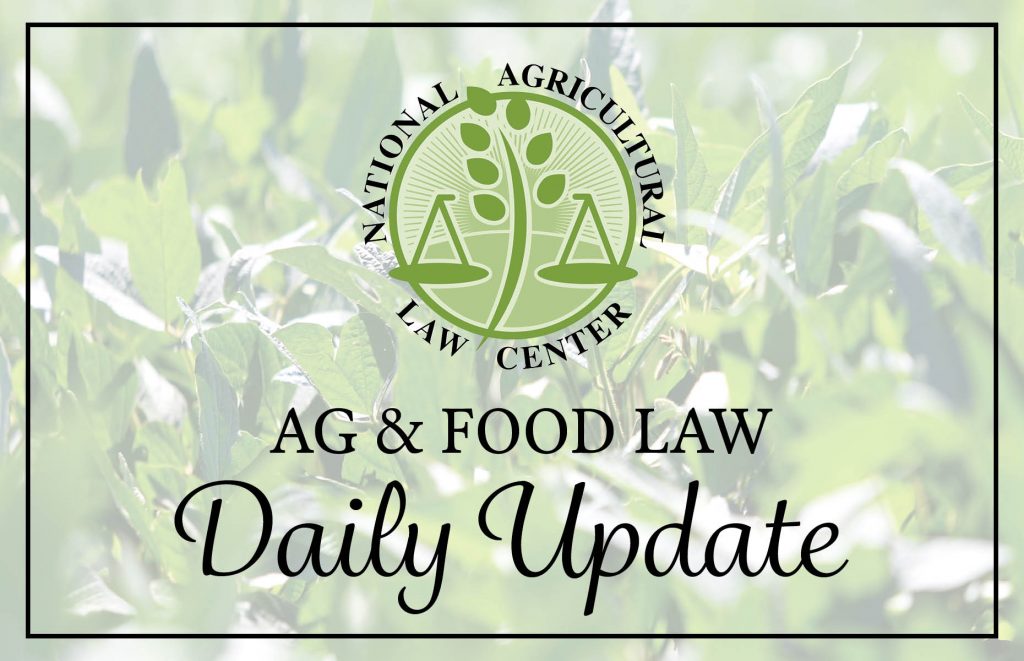A comprehensive summary of today’s judicial, legislative, and regulatory developments in agriculture and food. Email important additions HERE.
JUDICIARY: Includes CWA
In The Coal. to Protect Puget Sound Habitat v. U.S. Army Corps of Eng’rs, et al., No. 17-1209RSL, 2019 WL 5103309 (W.D. Wash. Oct. 10, 2019), the plaintiffs challenge the U.S. Army Corps of Engineers’ (Corps) issuance of Nationwide Permit 48 (NWP 48) which authorizes “discharges, structures, and work in the waters of the United States related to commercial shellfish aquaculture activities.” The plaintiffs allege that the Corps failed to comply with the Clean Water Act (CWA), the National Environmental Policy Act (NEPA), and the Endangered Species Act (ESA) when it issued NWP 48 in 2017. The plaintiffs request that decision to adopt NWP 48 in the state of Washington be vacated according to the Administrative Procedure Act (APA). The CWA authorizes the Corps to issue permits for the discharge or dredged or fill material into navigable waters of the United States. The Corps may issue nationwide permits if it determines that the discharges are similar in nature and will have only a minimal cumulative adverse effect. When issuing such general permits, the Corps is required to comply with NEPA. In issuing NWP 48, the Corps conducted an Environmental Assessment (EA) in accordance with NEPA, and concluded that the issuance of NWP 48 would not have a significant impact on the quality of the human environment. Therefore, the Corps determined that drafting an Environmental Impact Statement (EIS) was not necessary. The plaintiffs argue that these conclusions must be invalidated under the APA because the EA does not accurately describe the anticipated environmental impacts of NWP 48.
The court agreed with the plaintiffs that there was insufficient evidence in the record to support the Corps’ conclusion that issuance of NWP 48 will have minimal impacts on the environment. Although the minimal impacts finding was repeated throughout the Corps’ EA, the court concluded that the finding was based only on “(1) selectively chosen statements from the scientific literature, (2) the imposition of general conditions with which all activities under nationwide permits must comply, and (3) the hope that regional Corps districts will impose additional conditions and/or require applicants to obtain individual permits if necessary to ensure that the adverse impacts will be minimal.” The court concluded that the Corps violated both NEPA and CWA. Because parties in a related case have asked for an opportunity to be heard with regard to remedy, the court has requested that the parties file additional briefing documents discussing what the appropriate remedy should be.
REGULATORY: Includes AMS, NOAA
AGRICULTURAL MARKETING SERVICE (AMS)
Direct Final Rule increasing the value assigned to imported cotton for the purposes of calculating supplemental assessments collected for use by the Cotton Research and Promotion Program. Info here.
NATIONAL OCEANIC AND ATMOSPHERIC ADMINISTRATION
Advance Notice of Proposed Rulemaking to revise regulations at 50 CFR Parts 260 and 261 to improve the uniformity and reliability of voluntary seafood inspection services by adopting recognized best practices for inspection. Info here.
Advance Notice of Proposed Rulemaking establishing a control date of March 7, 2019, for the commercial sector of Spanish mackerel. Info here.
Temporary Rule prohibiting retention of Pacific cod by vessels using trawl gear and not participating in the cooperative fishery of the Rockfish Program in the Central Regulatory Area of the Gulf of Alaska (GOA). Info here.
